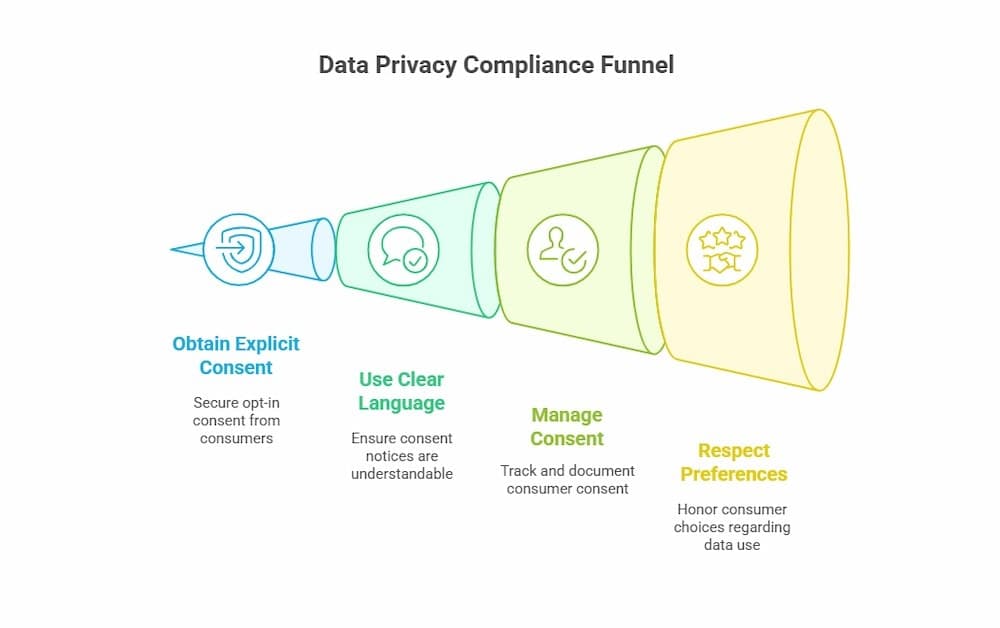Introduction
In 2025, digital consent has become a cornerstone of data privacy, particularly in the realm of video content. The Video Privacy Protection Act (VPPA), originally enacted in 1988, continues to exert significant influence over how companies handle consumer data related to video rentals and streaming services. The VPPA prohibits video tape service providers from knowingly disclosing personally identifiable information (PII) concerning consumers’ video viewing habits without their explicit consent. This law has gained renewed relevance with the proliferation of online video platforms and streaming services, prompting companies to reassess their data privacy practices to ensure compliance.
The rise of streaming services and online video platforms has led to increased scrutiny of data privacy practices under the VPPA and other privacy laws. Comprehensive state privacy laws, such as the California Consumer Privacy Act (CCPA), are driving changes in how businesses approach data privacy and consent. These laws emphasize the importance of explicit consent and transparency in consent processes, particularly in the context of sensitive data and data breaches. The absence of a comprehensive federal privacy law has contributed to the continued relevance and influence of the VPPA and state-level privacy laws, shaping the current regulatory landscape. As consumers become more aware of their rights, companies must prioritize data protection and privacy to maintain trust and comply with evolving regulations.
Data Privacy Laws
The VPPA remains a key federal privacy law that regulates the disclosure of personally identifiable information related to video rentals and streaming. Its provisions have been interpreted to apply to modern digital platforms, requiring companies to obtain explicit consent before sharing consumers’ video viewing data. This has significant implications for streaming services and online video platforms, which must ensure compliance with the VPPA’s requirements to avoid legal repercussions.
State data privacy laws, such as the Nebraska Data Privacy Act (NDPA), are being enacted to provide additional protections for consumer data. The NDPA, effective January 1, 2025, imposes obligations on businesses that process or sell personal data of Nebraska residents. It grants consumers the right to access, correct, delete, and obtain a copy of their personal data, as well as the right to opt out of targeted advertising and the sale of their personal data. The NDPA also requires businesses to obtain consent before processing sensitive data and to conduct data protection assessments for high-risk processing activities. Nebraska’s law is part of a broader trend of comprehensive privacy legislation being enacted at the state level. The proliferation of state privacy laws creates compliance challenges for businesses operating across multiple jurisdictions. As new laws are introduced in multiple states, the regulatory landscape becomes increasingly complex for organizations to navigate. At the same time, some state privacy laws include a private right of action, allowing individuals to sue for violations such as unauthorized data disclosure or breaches.
Comprehensive federal privacy legislation is still pending, but existing federal privacy laws provide some guidance on data privacy. The Health Insurance Portability and Accountability Act (HIPAA) protects health data, while the Fair Credit Reporting Act (FCRA) regulates consumer credit reports. The Federal Trade Commission (FTC) plays a crucial role in enforcing data privacy laws and regulating deceptive practices, ensuring that companies adhere to established standards for data protection. The ongoing evolution of data privacy law in the U.S. and the lack of a single, unified law present significant challenges for businesses seeking to comply with a patchwork of regulations.
Data Protection Principles
Data protection assessments are essential for companies operating in multiple jurisdictions to ensure compliance with various data privacy laws. These assessments help identify potential risks associated with data processing activities and implement appropriate safeguards to protect consumer data. Organizations should also minimize the collection and retention of unnecessary data to reduce privacy risks. The processing of sensitive data, including biometric data and genetic data, requires special consideration and protection to prevent unauthorized access and misuse. It is especially important to safeguard personally identifiable sensitive data, as legal requirements mandate strict protection of information that can directly identify individuals.
Risk assessments and data protection impact assessments are critical components of data privacy compliance strategies. Companies must prioritize transparency and accountability in their data handling practices to maintain consumer trust. Organizations should regularly review and document their data sharing practices to ensure compliance with evolving privacy regulations. This includes implementing robust data security measures, providing clear privacy notices, and ensuring that data processing activities align with consumers’ expectations and legal requirements.

Consumer Rights
Consumers have the right to obtain explicit consent for the collection and use of their personal data, including sensitive information. The opt-in consent model is becoming more prevalent, particularly for sensitive data and targeted advertising. Consumers are increasingly aware of their rights under privacy laws, including the right to access, correct, and delete their personal information.
The Kids Online Safety Act (KOSA) and other legislation aim to protect children’s data and provide additional safeguards for vulnerable populations. Certain laws require companies to obtain written consent from parents or guardians before collecting or processing children’s data. KOSA, reintroduced in 2025, mandates stronger default privacy settings for minors and prohibits harmful design features that could lead to self-harm, exploitation, or substance abuse. It has gained renewed support amidst increasing concern over online harms involving children.
Consumer Privacy
Consumer privacy is a critical concern in the digital age, with companies facing legal and reputational risks for non-compliance with data privacy laws. The use of universal opt-out mechanisms and global privacy control features can help companies demonstrate their commitment to consumer privacy. State wiretapping laws and other regulations may apply to companies that collect and use consumer data, including audio and video recordings.
Ad tech companies and social media platforms are under scrutiny for their data handling practices, particularly with regard to targeted advertising and sensitive personal information. Regulatory agencies have taken enforcement actions against social media companies for privacy violations, highlighting the need for stricter compliance and oversight. Companies must ensure that their data processing activities comply with applicable privacy laws and that they obtain explicit consent from consumers before collecting or using their personal data. Failure to do so can result in enforcement actions by regulatory agencies and significant fines.
Accountability Act
The Accountability Act and other regulations emphasize the importance of accountability and transparency in data privacy practices. Companies must implement robust compliance strategies to ensure adherence to data privacy laws and regulations. By doing so, organizations can help mitigate legal risk associated with privacy compliance, data sharing, and regulatory enforcement. Regular audits and risk assessments can help companies identify and address potential compliance gaps.
Enforcement actions by regulatory agencies, such as the FTC, can result in significant fines and reputational damage for non-compliant companies. Companies must prioritize data protection and privacy in their operations, including the use of data protection assessments and impact assessments. It is essential for companies operating in multiple jurisdictions, particularly in the context of cross-border data transfers, to maintain compliance with data privacy laws to avoid legal and reputational consequences.
Data Privacy Compliance
Data privacy compliance is a complex and ongoing process, requiring companies to stay up-to-date with evolving regulations and laws. Comprehensive data privacy laws, such as the CCPA, provide a framework for companies to follow, but compliance requires careful consideration of specific requirements and exemptions. Companies must prioritize data protection and privacy in their operations, including the use of data protection assessments and impact assessments. Robust compliance measures are essential for protecting Americans’ data from misuse and unauthorized access.
Maintaining compliance with data privacy laws is essential for companies operating in multiple jurisdictions, particularly in the context of cross-border data transfers. Companies must ensure that their data processing activities align with consumers’ expectations and legal requirements. This includes implementing robust data security measures, providing clear privacy notices, and ensuring that data processing activities align with consumers’ expectations and legal requirements.

Explicit Consent
Explicit consent is a critical component of data privacy compliance, particularly for sensitive data and targeted advertising. Companies must obtain opt-in consent from consumers before collecting and using their personal data, including sensitive information. The use of clear and concise language in consent notices is essential to ensure that consumers understand what they are agreeing to.
Consent management platforms and tools can help companies streamline their consent processes and ensure compliance with data privacy laws. These platforms enable companies to manage, track, and document consumer consent, providing a centralized system for handling consent requests and ensuring that consumers’ preferences are respected.
Transparency in Consent
Transparency in consent processes is vital to building trust with consumers and ensuring compliance with data privacy laws. Companies must provide clear and accurate information about their data handling practices, including the types of data collected and the purposes for which it will be used. The use of privacy notices and policies can help companies demonstrate their commitment to transparency and accountability.
Regular updates and revisions to consent notices and policies can help companies ensure ongoing compliance with evolving regulations and laws. Companies must ensure that their privacy notices are easily accessible and understandable to consumers, providing them with the information they need to make informed decisions about their personal data.
Financial Institutions and Enforcement
Financial institutions are subject to specific data privacy regulations, such as the Gramm-Leach-Bliley Act (GLBA), which requires financial institutions to explain their information-sharing practices to their customers and to safeguard sensitive data. These institutions must also comply with other applicable privacy laws, such as the Fair Credit Reporting Act (FCRA) and the Health Insurance Portability and Accountability Act (HIPAA), depending on the types of data they handle. Health care providers play a critical role in safeguarding healthcare data and must ensure compliance with HIPAA and other privacy regulations to protect sensitive health information.
Enforcement actions by regulatory agencies, such as the FTC, can result in significant fines and reputational damage for non-compliant companies. Companies must implement robust compliance strategies to ensure adherence to data privacy laws and regulations. Regular audits and risk assessments can help companies identify and address potential compliance gaps.
Enforcement Actions
Enforcement actions for non-compliance with data privacy laws are on the rise, as federal agencies like the Federal Trade Commission (FTC) and state authorities intensify their oversight of companies handling consumer data. The FTC has made headlines with high-profile enforcement actions against major tech companies such as Meta and Avast, resulting in substantial fines and settlements for violations related to collecting personal information without explicit consent and engaging in deceptive practices. These actions underscore the importance of adhering to privacy laws and maintaining robust data privacy compliance programs.
State authorities are also stepping up enforcement, with the California Attorney General’s office actively pursuing companies that fail to comply with the California Consumer Privacy Act (CCPA) and other state data privacy laws. These enforcement actions can lead to significant financial penalties, reputational harm, and a loss of consumer trust—consequences that can be far more damaging than the initial infraction.
The Video Privacy Protection Act (VPPA) continues to serve as a powerful tool for protecting consumer rights, particularly regarding the disclosure of personally identifiable information related to video viewing habits. Companies must obtain explicit consent from consumers before sharing their video viewing behavior, and failure to do so can trigger enforcement actions under the Video Privacy Protection Act VPPA. Both the FTC and state agencies are vigilant in pursuing companies that misuse sensitive data, especially when it comes to targeted advertising or collecting personal information without proper consent.
To avoid enforcement actions, companies must prioritize data privacy compliance, regularly review their data protection practices, and ensure they are obtaining explicit consent where required. Transparent data handling, clear privacy notices, and a proactive approach to consumer privacy are essential for maintaining compliance and protecting both consumer data and company reputation.
Global Privacy Control
Global privacy control features, such as opt-out mechanisms and privacy settings, can help companies demonstrate their commitment to consumer privacy. The use of universal opt-out mechanisms can help companies streamline their consent processes and ensure compliance with data privacy laws. Companies must prioritize transparency and accountability in their data handling practices to maintain consumer trust.
The use of global privacy control features can help companies ensure ongoing compliance with evolving regulations and laws. These features enable consumers to exercise their privacy rights across various digital experiences, providing them with greater control over their personal data.
Conclusion
Emphasizing explicit consent, transparency, and robust compliance strategies is essential for organizations to navigate the complex regulatory environment and maintain consumer trust. As digital ecosystems grow increasingly sophisticated and interconnected, so too must the mechanisms that govern data collection, sharing, and protection.
Digital consent in 2025 is more than a checkbox—it is a dynamic, evolving process that reflects growing consumer empowerment, technological sophistication, and global regulatory alignment. The VPPA’s continued relevance underscores a broader trend: foundational privacy laws are being reinterpreted and reinforced to meet the demands of the digital age.
Organizations that invest in transparent, ethical, and user-centric consent practices will be best positioned to thrive in this environment, earning not just legal compliance but also public trust and market leadership. As the saying goes, “privacy is a journey, not a destination,” and in 2025, that journey is more important than ever.



